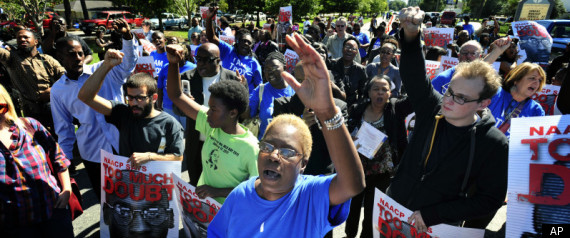 SAVANNAH, Ga. — Sent to death row 20 years ago as a convicted cop killer, Troy Davis was celebrated as "martyr and foot soldier" Saturday by more than 1,000 people who packed the pews at his funeral and pledged to keep fighting the death penalty.
SAVANNAH, Ga. — Sent to death row 20 years ago as a convicted cop killer, Troy Davis was celebrated as "martyr and foot soldier" Saturday by more than 1,000 people who packed the pews at his funeral and pledged to keep fighting the death penalty.Family, activists and supporters who spent years trying to persuade judges and Georgia prison officials that Davis was innocent were unable to prevent his execution Sept. 21. But the crowd that filled Savannah's Jonesville Baptist Church on Saturday seemed less interested in pausing in remorse than showing a resolve to capitalize on the worldwide attention Davis' case brought to capital punishment in the U.S.
Benjamin Todd Jealous, national president of the NAACP, brought the crowd to its feet in a chant of "I am Troy Davis" – the slogan supporters used to paint Davis as an everyman forced to face the executioner by a faulty justice system. Jealous noted that Davis professed his innocence even in his final words.
"Troy's last words that night were he told us to keep fighting until his name is cleared in Georgia," Jealous said. "But most important, keep fighting until the death penalty is abolished and this can never be done to anyone else."
After four years of extraordinary appeals, every court that examined Davis' case ultimately upheld his conviction and death sentence for the 1989 slaying of Savannah police officer Mark MacPhail, who was shot twice while trying to help a homeless man being attacked outside a bus station. MacPhail's family and prosecutors say they're still confident Davis was guilty.
Regardless, questions raised by Davis and his lawyers garnered support from thousands worldwide, including dignitaries such as former President Jimmy Carter and Pope Benedict XVI. The night Davis was executed, protests were held from Georgia to Washington, from Paris to Ghana.
During a call-and-response litany at the funeral, the congregation chanted in unison: "We pray to the Lord for our souls and the soul of Troy Davis, martyr and foot soldier."
"He transformed a prison sentence into a pulpit," the Rev. Raphael Warnock, pastor of Ebenezer Baptist Church in Atlanta, said in his eulogy Saturday. "He turned death row into a sanctuary."
Other than expressions of outrage at Davis' execution, there was little doom and gloom at his funeral. Warnock's congregation at Ebenezer, the church where Martin Luther King Jr. once preached, helped raise money for the 3 1/2 hour service, which carried more than a hint of celebrity sheen.
Davis' closed casket was piled with a spray of blue and white flowers – a color scheme decoded by a close friend who mentioned his love of the Dallas Cowboys. Attendees each got a glossy, 22-page program filled with a scrapbook's worth of photos, many of Davis in his white prison garb posing with family members during weekend visits.
A song by the Billboard-charting gospel singer Dietrick Haddon got the crowd so excited that ushers walked the aisles stopping people from taking video and photos with their cell phones.
And the comedian and activist Dick Gregory, who joined the others in an impassioned call to end the death penalty, first brought people to their feet in laughter.
Gregory said he needed to apologize to Davis' family after the way he handled a recent phone call from a bill collector. "He said, `Are you Dick Gregory?' And I said, `I am Troy Davis!'"
Davis' nephew, 17-year-old DeJaun Davis-Correia, was the only family member to speak during the service.
He recalled Davis, the uncle who had been in prison his entire life, spending long hours with him on the phone helping with homework, particularly math. Davis-Correia, whose mother is Davis' older sister, said the family always knew when he had tests in school because Davis wrote them all down on his calendar, the same calendar he filled with the birthdays of all his friends and supporters. And he said his uncle would have wanted a note of celebration at his funeral.
"You really shouldn't be sad all the time, you should be happy and be positive," Davis-Correia said. "That's the attitude my uncle instilled in me."
Amnesty International, which worked for years to exonerate Davis, urged its supporters worldwide to remember him Saturday by wearing black armbands and "I am Troy Davis."
The advocacy group's U.S. director, Larry Cox, spoke from the dais behind Davis' casket Saturday urging those who fought to spare his life not to give up until America ends its use of the death penalty.
"If you thought you saw us fighting to save Troy Davis, now that we've been inspired by Troy Davis, you ain't seen nothing yet," Cox said.
Origin
Source: Huffington
No comments:
Post a Comment